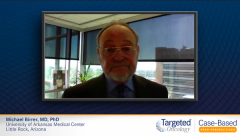
Combination Pembrolizumab-Lenvatinib in Advanced Endometrial Cancer
Expert perspectives on Study 309/KEYNOTE-775, which combined pembrolizumab with lenvatinib in patients with advanced endometrial carcinoma.
Episodes in this series

Case: A 70-Year-Old Woman With Endometrial Cancer
Initial Presentation
- A 70-year-old postmenopausal woman presents after experiencing abnormal uterine bleeding for about 3 months. She has a grown daughter, underwent menopause at 52 years of age, and her father had prostate cancer in his late 60’s.
- PMH: Unremarkable
- PE: Notable for large uterus and tenderness upon palpation
Clinical work-up
- Endometrial biopsy: endometrioid adenocarcinoma, FIGO grade 1
- Surgery: ELAP TAH BSO with bilateral pelvic node dissection
- Pathology: grade 2 endometrioid adenocarcinoma, 15 negative pelvic nodes, invasive 1.9 cm of 2.4 cm myometrium
- Molecular testing shows MSI-high, MMR proficient, and HER2-
Treatment
- Postoperative radiotherapy: vaginal cuff brachytherapy to a dose of 21 Gy in 3 fractions
- 12 months after completing radiotherapy, she presented with new RLE edema and right hydroureter
- She then was treated with carboplatin/paclitaxel chemotherapy which was well tolerated
Treatment
- 15 months later the patient has disease relapse with metastases to the paraaortic lymph nodes
- She is now treated with pembrolizumab
Transcript:
Michael Birrer, MD, PhD: When the whole microsatellite-unstable phenomenon broke through, it came from TCGA [The Cancer Genome Atlas] of endometrial cancer, and then pembrolizumab splashed onto the scene. We knew we had a new option for about 35% of endometrial cancers, but the other 65% to 75% are microsatellite-stable tumors. What do we have to offer for them? Along comes this combination of lenvatinib plus pembrolizumab. Lenvatinib is a bit of a dirty kinase. It’s not as narrow and specific as others, but that’s probably why it works—meaning it’s inhibiting a number of tyrosine kinases, 1, 2, or 3 of which then synergize with the immune modulation from pembrolizumab.
Initial studies were phase 2 trials, most coming out of [Johns] Hopkins, showing this tremendous response rate, pushing toward 50%. But more important, [they had] a disease control rate around 75%, meaning there were patients who didn’t get a response but had shrinkage and control of their tumor. This combination looked interesting, but KEYNOTE-775 was the home run, directly examining this combination in comparison with standard of care, which is chemotherapy. This showed not only a progression-free survival advantage but an overall survival advantage. I would ask anybody in the audience, “How many times have you seen a randomized phase 3 trial in endometrial cancer showing an overall survival advantage?” It’s very rare.
For years, we used doxorubicin based on no objective survival advantage data. Here we have a combination that’s terrific and very effective, and it’s targeted to the microsatellite-stable population, which is the majority. The only thing to remember is that while pembrolizumab has a very defined toxicity profile, lenvatinib is a little harder as a tyrosine kinase inhibitor. It has hypertension, which can be impressive and quick; diarrhea; and fatigue. People just need to realize that the FDA-approved dose is 20 mg, which I use, but a lot of my colleagues start at 10 or 14 mg because they’re worried about the toxicity.
Transcript edited for clarity.








































